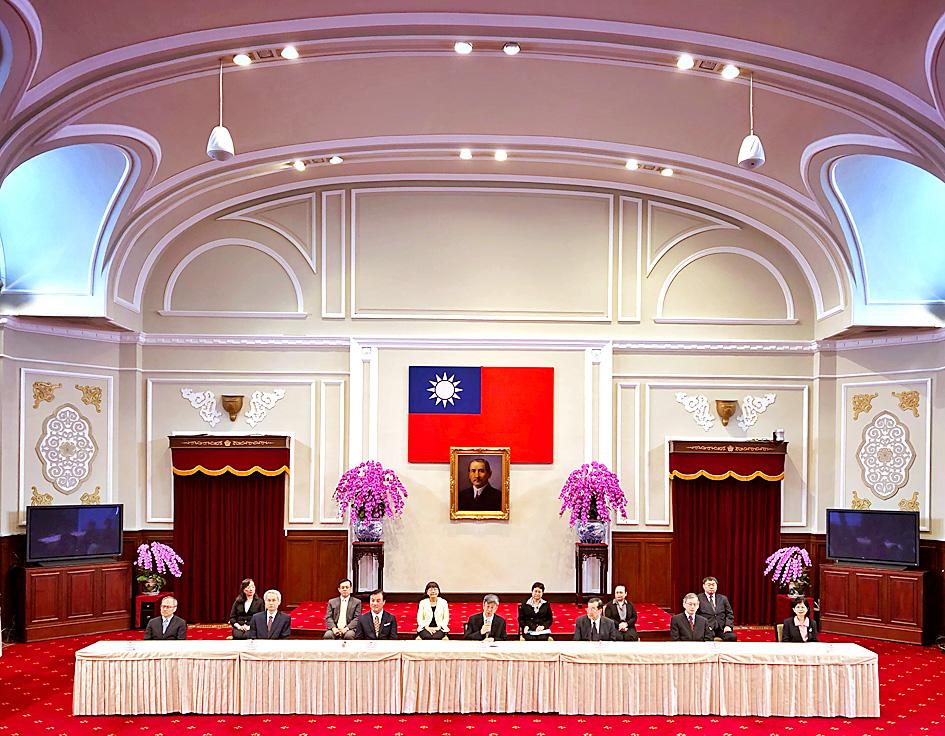President Tsai Ing-wen (蔡英文) yesterday submitted a list of 11 nominees for high-ranking posts in the Examination Yuan to streamline the government branch responsible for national exams and management of civil service personnel starting its next term in September.
Before the list was sent to the Legislative Yuan for confirmation, Tsai met with the nominees at the Presidential Office.
Former minister of education Huang Jong-tsun (黃榮村) and Minister of Civil Service Chou Hung-hsien (周弘憲) have been nominated to be president and vice president of the government branch.

Photo: CNA
Former vice president Chen Chien-jen (陳建仁), who headed the team to select the nominees out of 60 candidates, said that Tsai picked Huang for his government experience and Chou for his insight into the Examination Yuan after four years in his ministerial post.
Tsai said that she hoped the nine other nominees, who would serve as Examination Yuan ministers without portfolio, would assist Huang, Chou and the body’s two subordinate ministries to push for reforms while working in cooperation with the Executive Yuan, Chen said.
Two of the nominees, Yang Ya-hwei (楊雅惠) and Chen Tsi-yang (陳慈陽), are Examination Yuan members who joined in 2014 and 2017 respectively.
Other nominees include former university presidents or vice presidents, such as former Southern Taiwan University of Science and Technology vice president Wu Hsin-hsing (吳新興) and former National Taipei University of Technology president Yao Leeh-ter (姚立德), the Presidential Office said.
The office said it expects the Legislature to review and approve the nominees by the end of next month, before the new Examination Yuan term begins on Sept. 1.
The term would be the first under amendments to the Organic Act of the Examination Yuan (考試院組織法) passed in early January, which shortens the terms of members from six to four years and cuts the number of members from between 17 and 19 to between seven and nine.

The Grand Hotel Taipei on Saturday confirmed that its information system had been illegally accessed and expressed its deepest apologies for the concern it has caused its customers, adding that the issue is being investigated by the Ministry of Justice Investigation Bureau. The hotel said that on Tuesday last week, it had discovered an external illegal intrusion into its information system. An initial digital forensic investigation confirmed that parts of the system had been accessed, it said, adding that the possibility that some customer data were stolen and leaked could not be ruled out. The actual scope and content of the affected data

‘LIKE-MINDED PARTNER’: Tako van Popta said it would be inappropriate to delay signing the deal with Taiwan because of China, adding he would promote the issue Canadian senators have stressed Taiwan’s importance for international trade and expressed enthusiasm for ensuring the Taiwan-Canada trade cooperation framework agreement is implemented this year. Representative to Canada Harry Tseng (曾厚仁) in an interview with the Central News Agency (CNA) said he was increasingly uneasy about Ottawa’s delays in signing the agreement, especially as Ottawa has warmed toward Beijing. There are “no negotiations left. Not only [is it] initialed, we have three versions of the text ready: English, French and Mandarin,” Tseng said. “That tells you how close we are to the final signature.” Tseng said that he hoped Canadian Prime Minister Mark Carney

President William Lai (賴清德) yesterday bestowed one of Taiwan’s highest honors on Saint Vincent and the Grenadines (SVG) Ambassador Andrea Clare Bowman in recognition of her contributions to bilateral ties. “By conferring the Order of Brilliant Star with Grand Cordon on Ambassador Bowman today, I want to sincerely thank her, on behalf of the Taiwanese people, for her outstanding contribution to deepening diplomatic ties between Taiwan and SVG,” Lai said at a ceremony held at the Presidential Office in Taipei. He noted that Bowman became SVG’s first ambassador to Taiwan in 2019 and

POSITIVE DEVELOPMENT: Japan and the US are expected to hold in-depth discussions on Taiwan-related issues during the meeting next month, Japanese sources said The holding of a Japan-US leaders’ meeting ahead of US President Donald Trump’s visit to China is positive news for Taiwan, former Japan-Taiwan Exchange Association representative Hiroyasu Izumi said yesterday. After the Liberal Democratic Party’s landslide victory in Japan’s House of Representatives election, Japanese Prime Minister Sanae Takaichi is scheduled to visit the US next month, where she is to meet with Trump ahead of the US president’s planned visit to China from March 31 to April 2 for a meeting with Chinese President Xi Jinping (習近平). Japan and the US are expected to hold in-depth discussions on Taiwan-related issues during the